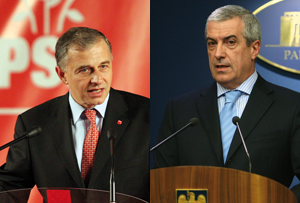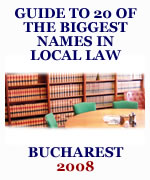Making deals to survive
Ahead of the local elections, parties are forging alliances with their political enemies to secure a strong base before the general vote later this year
 |
|
|||||||||||||
Romania’s political scene is now encountering a high frequency of backroom deals ahead of the local elections in early June.
Polls are showing that one party remains in front - the new Democratic Liberal Party (PDL). This is headed by ex-Prime Minister Theodor Stolojan and Cluj-Napoca mayor Emil Boc, and is indirectly patronised by President Traian Basescu. Large parties such as the Social Democratic Party (PSD) and the governing National Liberal Party (PNL) have fallen in popularity since the 2004 elections.
In the last two years, the PSD, the PNL, the Conservative Party (PC), the Greater Romania Party (PRM) and the Democratic Union of Hungarians in Romania (UDMR) have formed a coalition of the willing to isolate the PDL members in the Parliament.
This relationship is set to become closer. As The Diplomat went to press, the Social Democrats were negotiating with the Liberals to create an alliance. However some Liberals, allegedly including Prime Minister Calin Popescu Tariceanu, do not want to publicly associate with the PSD, because of the corruption accusations surrounding the party. On paper, the PNL and PSD are ideological opposites. An association between these two parties is absurd as a coalition of Germany’s Liberal Party and its Social Democrats. But the PNL has undertaken a policy mix more associated with the short-term interests of a populist left-wing party over the last year, including delaying announced privatisations in the energy sector and doubling the rate of pensions.
'1') {
require('php/art_auth.inc');
}
?>
The two parties will probably make deals on tactical voting to win in the local elections. There are two rounds of voting in these elections. If no local candidate scores above 50 per cent in the first round, there is a run-off between the two best performing candidates. In a certain city, town or village, the PSD and PNL could support whichever of their candidates has the highest chances of victory.
These tactical alliances will be a rehearsal for the general election, due at the end of this year, to see if a PNL-PC-PSD-UDMR pole can secure a majority.
Strange relationship
The Liberals now govern with UDMR with support from only 20 per cent of the Parliament. At this rate, the only chance the party has to govern in the next parliamentary elections is to make alliances.
One unexpected move was PNL’s announcement to merge with the Popular Action (AP), a tiny party polling less than one per cent, created by the President between 1996 and 2000, Emil Constantinescu. This was no more than a photo-call between Constantinescu and Tariceancu, with the ex-leader patronising the Prime Minister. Its efficacy was also undermined by Constantinescu’s decision, one day later, to resign from politics altogether.
The Liberals are also negotiating an alliance with the Peasant’s Party (PNTCD). This party’s significant figure is Gheorghe Ciuhandu, mayor of Timisoara, which could secure some support from the Banat.
Greater Romania, smaller chances
The Greater Romania Party (PRM) failed to enter the European Parliament after the elections on 25 November last year, but political analyst Cornel Codita believes PRM will probably gain around seven per cent at local elections. “Entering the European Parliament was not an important stake for PRM voters, but they may consider this party a political force in Parliament and that it deserves to win some city halls,” Codita says.
Meanwhile political analyst at NGO Asociatia Pro Democratia, Cristian Parvulescu, says that PRM has a history of winning more votes at parliamentary elections than locally, where it scores around five per cent. Lately the Greater Romania Party has not evidently been part of pre-electoral negotiations between parties.
Hungarians split
The Democratic Union of Hungarians in Romania is in danger of losing its place in Parliament for the first time. In the previous elections the party gained around six per cent, which corresponds to the percentage of the Hungarian minority in Romania. The party dropped in the latest polls, partly due to lack of reform among its leaders, who are more or less the same as in 1990. Another party promoting the Hungarian interests, the Hungarian Civic Party (PCM), is gaining in popularity. The leaders of PCM are mostly ex-members of UDMR with more radical views on Hungarians’ rights. They have chances to gain victories in the local elections in the counties of Mures, Covasna and Harghita, where Hungarians collectively form the majority. Following these elections, the two parties will need to find common ground, because splitting the Hungarian vote for the general elections means both parties may not pass the five per cent threshold needed to enter Parliament.
Hope for the conservatives: TV
The Conservative Party is targeting six per cent in the local elections. “We count on the pensioners and social classes which have suffered from the transition to democracy in the last 18 years, like the workers in the former single-industry towns and the people in the countryside,” says president of PC Daniela Popa.
In polls PC has an average of less than two per cent. The Conservatives are negotiating with all parties on a local level to win city halls and some seats in local and county councils.
The PC has a strong bargaining chip in Romanian politics. It has massive media exposure on TV stations Antena 1 and Antena 3 and in newspaper Jurnalul National, which belong to the daughter of Dan Voiculescu, who is a key figure in the party.
Voiculescu quit as PC president after the European Parliamentary elections, when the party won only 2.4 per cent of the votes and failed to pass the threshold needed to enter the EP. According to Parvulescu, the salvation of the Conservatives can only be an alliance, similar to its deals between the PSD in the 2000 and 2004 elections. But this time, he says, it will be harder for the Conservatives to strike a deal with a party because the PC is “not trustworthy”. The party piggy-backed on the Social Democratic vote to enter Parliament in 2004 and, afterwards, dropped the PSD, so that it could join the coalition Government.
New Generation, old news
In early 2007 the New Generation Party, led by financier of Steaua Football Club Gigi Becali, scored ten per cent in polls. But Becali then fired football hero Gheorghe Hagi from the post of trainer at Steaua to great public resentment. Consequently, in the European elections, the PNG failed to gain over the five per cent threshold necessary to enter the European Parliament (EP). “Some PNG voters might have deemed Gigi Becali suitable for the Romanian Parliament, but unsuitable for the EP,” says general manager at CURS, sociologist Catalin Augustin Stoica. “Against this backdrop, I would not rush to declare PNG or PRM history.”
But Parvulescu believes the EP elections are the beginning of the end for PNG. “They could not convince voters even in the favourable conditions of the EP elections, due to the low turnout and the chance to mobilise the radical vote,” he adds.
Electoral novelty
This year Romanians will vote under new rules mixing the existing proportional system with a uninominal concept, otherwise known as the first-past-the-post system. This latter mode sees voters elect an individual or party member in a discrete constituency. Who gains from this new system remains a complete mystery. In local elections, it will apply to county council presidents, who were previously elected by county council members. These positions will be hard-fought during the campaign because county council leaders divide the county budget to their respective cities, towns and villages. Previous experience has also shown that many of these presidents become considerably wealthy after a four year mandate.
The first round of local elections will take place on 1 June and the second on 15 June and the turnout is expected to be higher than the 29.4 per cent in last November’s European Parliamentary elections. Voters tend to choose slightly differently in local compared to general elections. Locally, charismatic or effective candidates can make a major difference to the final score. The prime example of this is Mayor of Sibiu Klaus Johannis, who is a member of the German minority party, the Democratic Forum of Germans in Romania (FDGR) and retains popularity among voters who choose national parties in general elections. Candidates’ political affiliation is less important than candidates’ abilities and experience, argues Stoica. “Our polls indicate that voters tend to be more interested in local elections than in elections for the EP or Romanian Parliament,” the general manager of CURS explains.
But this has not been helped by the decision to place the elections in the same week as the European Football Championship, where Romania faces nail-biting matches between France, Holland and Italy.

















